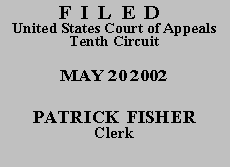

Plaintiff - Appellant,
v.
PROVO CITY CORPORATION; JOSEPH JENKINS, Mayor of Provo City, in his personal, professional and private capacity; SWEN NIELSEN, Police Chief, in his personal, professional and private capacity; GARY GREGERSON, City Attorney, in his personal, professional and private capacity; ROBERT WEST, Assistant City Attorney, in his personal, professional and private capacity; RICK ROMNEY, Assistant City Attorney, in his personal, professional and private capacity; DAVID DIXON, Assistant City Attorney, in his personal, professional and private capacity; GEORGE KARLSVEN, Finance Director, in his personal, professional and private capacity; PROVO CITY POWER; FEDERAL DEPOSIT INSURANCE CORPORATION, as receiver for Heartland Federal Savings and Loan Association of Pona City, Oklahoma; REAL ESTATE MANAGEMENT SERVICE; BRAD SEARS, Owner/Manager of Real Estate Management Services, in his personal, professional and private capacity; KAY BRYSON, Utah County Attorney, in his personal, professional and private capacity,
Defendants - Appellees,
and
COMMERCIAL FEDERAL BANK OF OMAHA NEBRASKA,
Defendant.
Alleging violations of a number of state and federal statutes, Stanley Elwood sued Provo City, Utah, a municipality, and nearly a dozen individuals and corporations, including a federally chartered corporation. His suit arises from events occurring in June 1989, after several intoxicated minors were arrested as they left Elwood's nightclub in Provo. The discovery that minors had been served alcohol at Elwood's business prompted an investigation, led by the office of Provo's mayor, into whether Elwood violated the terms and conditions of his city-issued business license. The investigation led to an administrative hearing, which Elwood attended and at which city officials presented evidence. The hearing officer made certain factual findings and issued a ruling temporarily suspending Elwood's business license; it also imposed what Elwood regards as excessive restrictions on its reinstatement.
Filed in March of 1998, Elwood's pro se complaint alleges that city officials conspired to deprive him of his livelihood by convening a corrupt and ultra vires administrative proceeding and later enforcing the hearing officer's findings. It also accuses the Federal Deposit Insurance Corporation (FDIC), as receiver for the commercial bank that formerly owned the property in which the nightclub was located, of coercing Elwood into signing an unlawful addendum to his lease. This same accusation is similarly directed at an agent for a real estate leasing firm as well as the agency itself. Finally, the complaint alleges that the county attorney committed various misdeeds, including his refusal to prosecute lawyers from Provo's legal department for failing to swear a proper oath of office.
Save one claim, the district court dismissed Elwood's suit for failing to comply with various statutes of limitations. With respect to the oath-of-office claim, which appears to arise under 42 U.S.C. § 1983, the district court ruled that the county attorney enjoyed both absolute prosecutorial immunity and qualified immunity. Two days later the district court granted the FDIC's motion to dismiss, concluding that Elwood did not serve a copy of his complaint on the FDIC in a timely manner under Rule 4(m) of the Federal Rules of Civil Procedure. Still later the district court, on statute of limitations grounds, granted a motion to dismiss filed by the real estate leasing firm and its agent. Elwood appeals from all three dispositive orders.
We agree with the district court's rulings regarding the expiration of the controlling statutes of limitations. Apart from the oath-of-office claim, all acts of misconduct alleged in Elwood's complaint occurred between June 1989 and May 1991 (most occurred in 1989). Elwood did not file his complaint until March 1998, nearly seven years after the last allegedly wrongful act. Under Utah law, the statute of limitations for actions arising under 42 U.S.C. § 1983 is four years. Utah Code Ann. § 78-12-25(3); Sheets v. Salt Lake County, 45 F.3d 1383, 1387 (10th Cir. 1995). For actions based on written contracts or for actions against public officers, it is six years. Utah Code Ann. § 78-12-23(2) (contracts) and § 78-12-24 (public officers). These periods of limitations, all of them exceeded here, encompass Elwood's many claims. We also agree with the district court's conclusion that Elwood failed to establish the elements necessary to toll the various limitation periods under the discovery rule.(1)
As for the district court's ruling granting the county attorney immunity
against Elwood's oath-of-office claim, Elwood does not appear to challenge that
ruling on appeal. He offers no argument and cites no authority suggesting that
the district court erred. Indeed, he mentions the immunity determination for the
first time in his reply brief, yet still he does not object to the court's reasoning.
He has therefore waived the issue. See State Farm Fire & Cas. Co. v. Mhoon,
31 F.3d 979, 984 n.7 (10th Cir. 1994) ("[A]ppellant failed to raise this issue in his
opening brief and, hence, has waived the point.").
The order dismissing all defendants, issued by the United States District
Court for the District of Utah on September 10, 2001, isAFFIRMED.
Appellant's Motion to File a Supplemental Reply Brief is GRANTED.
Entered for the Court
Circuit Judge
*. This order and judgment is not binding precedent, except under the doctrines of law of the case, res judicata, and collateral estoppel. The court generally disfavors the citation of orders and judgments; nevertheless, an order and judgment may be cited under the terms and conditions of 10th Cir. R. 36.3.
1. Our determination that Elwood's claims are barred by the statute of limitations renders it unnecessary to review the merits of the district court's ruling with respect to the FDIC. It appears that the FDIC did not raise limitations in its successful motion to dismiss below, and thus the court did not discuss the issue. This court, however, can affirm a lower court's ruling on an alternate ground, provided it is supported by the record. United States v. Sandoval, 29 F.3d 537, 542 n.6 (10th Cir. 1994).